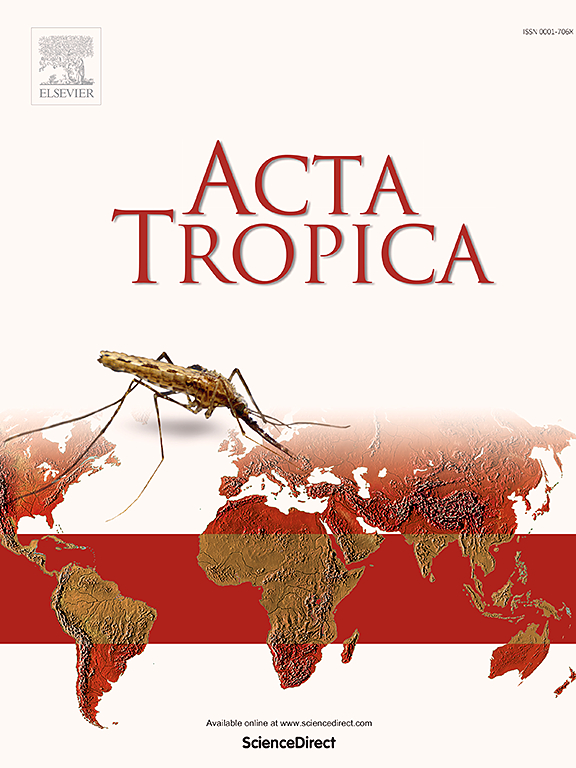Three annual cross-sectional community-based Knowledge, Attitudes and Practices (KAP) and prevalence surveys for urogenital schistosomiasis infection in two rural communities within Mangochi and Nsanje Districts, southern Malawi
IF 2.1
3区 医学
Q2 PARASITOLOGY
引用次数: 0
Abstract
In 2022 the World Health Organization (WHO) issued guidelines with key interventions to control and eliminate schistosomiasis in endemic countries. In Malawi, whilst praziquantel Mass Drug Administration (MDA) campaigns have been ongoing for over a decade, implementation of other interventions have not been formally assessed. To help formulation of an integrated country-specific control strategy, we assessed the Knowledge, Attitudes and Practices (KAP) and infection prevalences in two representative rural communities in Mangochi and Nsanje Districts. Longitudinal cross-sectional community-based questionnaire surveys were undertaken with participants aged from 6 to 45 years in 2022 and later repeated in 2023 and in 2024. Participants (including children aged 2 to 5 years) provided urine samples for parasitological tests. Comparative analysis involved calculation of percentages, tabulations, frequencies, and a logistic regression (logit) model to assess the effect of education level, gender, age, and study area on general and correct knowledge of schistosomiasis. A total of 1964 participants took part in the KAP surveys in 2022, and 1789 and 1908 participants were followed up in 2023 and 2024 respectively, while for the parasitological surveys, 2,319 participants took part in 2022, and 2,006 and 2,014 participants were followed up in 2023 and 2024 surveys respectively. In total, 53.2 % were from Mangochi, 55.5 % were females, 62.1 % were School-Aged Children (SAC) and 37.9 % were adults with their mean ages at 11 and 28 years, respectively. Overall, 65.5 % of respondents demonstrated satisfactory (≥50.0 % – ≤70.0 %) knowledge of schistosomiasis while only 5.1 % correctly mentioned freshwater snails as intermediate hosts. In 2022, prevalence of urogenital schistosomiasis by urine microscopy was 43.6 %, which despite annual MDA increased to 44.1 % in 2023, then after biannual MDA decreased to 27.0 % in 2024. In 2022, 10.5 % of all participants had heavy-intensity infections which increased to 11.4 % in 2023 before decreasing to 7.7 % in 2024. The majority (91.3 %) used a borehole or piped source of drinking water and used a latrine to urinate or defecate (93.8 %) although many (59.6 %) reported to have visited a freshwater body more than once in a day. Since MDA has taken place over several years in these areas and only had insufficient local impact, we strongly encourage addition of complementary methods to bolster its impact. It is therefore essential to engage individuals and communities, improving their understanding of disease and behaviour change to more effectively control and potentially eliminate schistosomiasis.

在马拉维南部Mangochi和Nsanje地区的两个农村社区对泌尿生殖系统血吸虫病感染进行了三次年度横断面社区知识、态度和做法(KAP)和流行病学调查。
2022年,世界卫生组织(世卫组织)发布了指导方针,其中包括在流行国家控制和消除血吸虫病的主要干预措施。在马拉维,虽然吡喹酮大规模给药运动已经进行了十多年,但尚未对其他干预措施的实施情况进行正式评估。为了帮助制定针对具体国家的综合控制战略,我们评估了Mangochi和Nsanje两个具有代表性的农村社区的知识、态度和做法(KAP)以及感染流行情况。研究人员于2022年对6至45岁的参与者进行了纵向横断面社区问卷调查,并于2023年和2024年进行了重复调查。参与者(包括2至5岁的儿童)提供尿液样本进行寄生虫学测试。比较分析包括计算百分比、表格、频率和逻辑回归(logit)模型,以评估教育水平、性别、年龄和研究区域对血吸虫病一般和正确知识的影响。2022年共有1964名参与者参与,2023年和2024年分别随访了1789名和1908名参与者。其中,来自Mangochi的占53.2%,女性占55.5%,学龄儿童占62.1%,成人占37.9%,平均年龄分别为11岁和28岁。总体而言,65.5%的受访者对血吸虫病有满意的认识(≥50% -≤70%),而只有5.1%的人正确地提到淡水蜗牛是中间宿主。2022年尿镜检泌尿生殖道血吸虫病患病率为43.6%,2023年尽管每年MDA升高至44.1%,但经过两年MDA后,2024年降至27.0%。2022年,10.5%的参与者患有重度感染,2023年上升到11.4%,2024年下降到7.7%。大多数人(91.3%)使用钻孔或管道饮用水源,并使用厕所小便或排便(93.8%),尽管许多人(59.6%)报告每天不止一次访问淡水水体。由于MDA已经在这些地区进行了数年,并且仅产生了不足的局部影响,因此我们强烈鼓励添加补充方法来增强其影响。因此,必须让个人和社区参与进来,提高他们对疾病和行为改变的理解,以便更有效地控制和潜在地消除血吸虫病。
本文章由计算机程序翻译,如有差异,请以英文原文为准。
求助全文
约1分钟内获得全文
求助全文
来源期刊

Acta tropica
医学-寄生虫学
CiteScore
5.40
自引率
11.10%
发文量
383
审稿时长
37 days
期刊介绍:
Acta Tropica, is an international journal on infectious diseases that covers public health sciences and biomedical research with particular emphasis on topics relevant to human and animal health in the tropics and the subtropics.
 求助内容:
求助内容: 应助结果提醒方式:
应助结果提醒方式:


